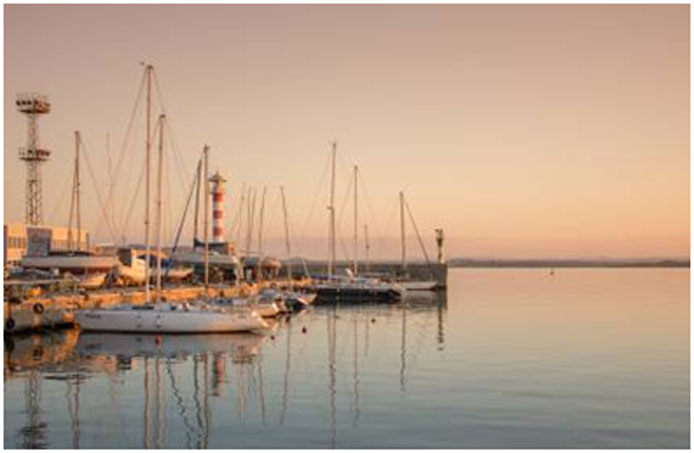
Persons working in this area fall into two camps: those who serve in universities and teach courses in fisheries science, and those who educate the general public about the sea. The latter are called marine education specialists. They work for aquaria, colleges, and marine institutes and frequently prepare publications for the media. Many teach programs about the sea for school teachers who wish to integrate such information into their own courses. Marine education specialists work with fishing information, oceanography, and coastal zone management. This occupation's professional organization, The National Marine Educators Association, hosts a web site with excellent links at www.marine-ed. org. Extension agents are educators who prepare reports, deliver talks, give advice to fishermen, and keep up with problems and trends in the industry.
ADMINISTRATORS
Administrators plan programs, coordinate budgets, and execute policies. They meet frequently with government officials (many fisheries administrators actually work in various government agencies) to discuss regulations and ways of improving business. A major responsibility of many administrators is public relations- working to improve fish sales and profit for the groups they serve.
RESEARCHERS
Areas of investigation for marine researchers include physiology, ecology, population dynamics, water quality, pathology, limnology, marine biology, and several other fields. While specializing in fish, these researchers must also rely on using other related areas of knowledge. Usually, a researcher will deal with species from either freshwater or saltwater, but not from both. The former's work frequently relates to the stocking of bodies of water within a state. The researcher tries to maximize the success of the stocking program. Saltwater specialists work with all types of species but usually limit their interest to a few. Some engage in rather exciting activities, such as the study of shark behavior. Maybe you've read or seen on television the results of some of this work.
Often these scientists research mysteries. For example, phenomena that have occurred in Alaska among the Bering Sea fishermen have been the abrupt disappearance of their catch king crabs. This periodic appearance and disappearance has created havoc with people's lives, the economy, and the town of Dutch Harbor, Alaska. The latter has vacillated between boom, as North America's busiest fishing town, and bust!
Dr. Nancy Targett, a marine biologist at the University of Delaware, has researched artificial bait for the fishing industry. She hopes to find artificial horseshoe crab bait that works as well as the real one. Contributions such as this can preserve the horseshoe crab.
MANAGEMENT POSITIONS
Managers work to maintain or develop fish populations for recreational or commercial reasons. Persons working in this capacity pay close attention to fish kills, monitor water pollution, estimate seasonal catches, reclaim new fishing grounds, work with conservation groups, and inform the public about the general state of fishing. One type of manager is the fish culturalist.
FISH CULTURALISTS
Fish culturalists, also known as aqua culturalists, manage public or private fish hatcheries, applying knowledge of management and fish culturing techniques. This management specialty requires a working knowledge of the nutritional and environmental needs of various species. General duties may involve overseeing, trapping, and spawning of fish; incubation of eggs; rearing of fry (young offspring); and the movement of fish to lakes, ponds, streams, or commercial tanks. A specific job might entail taking a species native to one area and introducing it in a new area. This is presently being done with Pacific salmon in Lake Michigan.
Persons in the fishery sciences have advanced training. Those who serve as assistants or technicians usually have at least an associate degree; many have a bachelor's. A typical two-year pro-gram resembles that of Ketchikan Community College in Ketchikan, Alaska, in addition to general courses.
Most of the others working in the profession have advanced degrees; some have doctorates, particularly those in research. In addition, federal government positions require a civil service examination. Approximately 135 colleges offer courses in fisheries biology; of these about 45 offer a major program leading to a degree. If such a program is consistent with your career goal, your high school courses should reflect college preparatory subjects with a science emphasis.
Typical of college level courses are the following, which form part of the program at the University of Minnesota:
Fishery Management
Fundamentals of population control; use of fishing regulations; habitat development; water quality control; use of artificial stocks for population maintenance; relationship between sport and commercial fisheries, including economic aspects; fundamentals of hatchery practice; and pond management.
Fishery Ecology in Polluted Waters
Description of degrading water quality control factors and influence on fish production.
Fishery bioassay, setting of standards and determination of criteria for aquatic organisms, and administrative problems of pollution abatement. The Biological effects of various pollutants on fish.
In Newfoundland, Canada, Memorial University houses the Fisheries and Marine Institute. One aspect of the Institute-the Fishing Technology Unit-works to improve the viability of fish harvesting through solving problems in the operation of fishing gear and equipment.
In addition to college and university degree programs, some institutions such as Clatsop Community College in Oregon offer certificate programs that focus on specific training for fishermen.
Aquaculture or mariculture is fast-growing industry involves growing fish in a systematic fashion in both saltwater and freshwater, indoors and outside. Aqua culturists conduct development and training programs for those in the business; they often write research proposals and consult with fish biologists and entrepreneurs to promote the industry. While a young industry, it has proven economically feasible and has the potential to provide quality protein. Undoubtedly it will continue to expand. Aqua culturists normally have a master's degree (some have doctorates); their educational background usually combines marine biology and business management. Opportunities and salaries appear very good; this truly will be a career of the twenty-first century.
See the following articles for more information:
- Find Your Calling: A Checklist
- 5 Ways To Build Your Career Outside of the Office
- How To Impress Your Interviewer When Making a Career Change
- 5 Tips For Successful Networking
